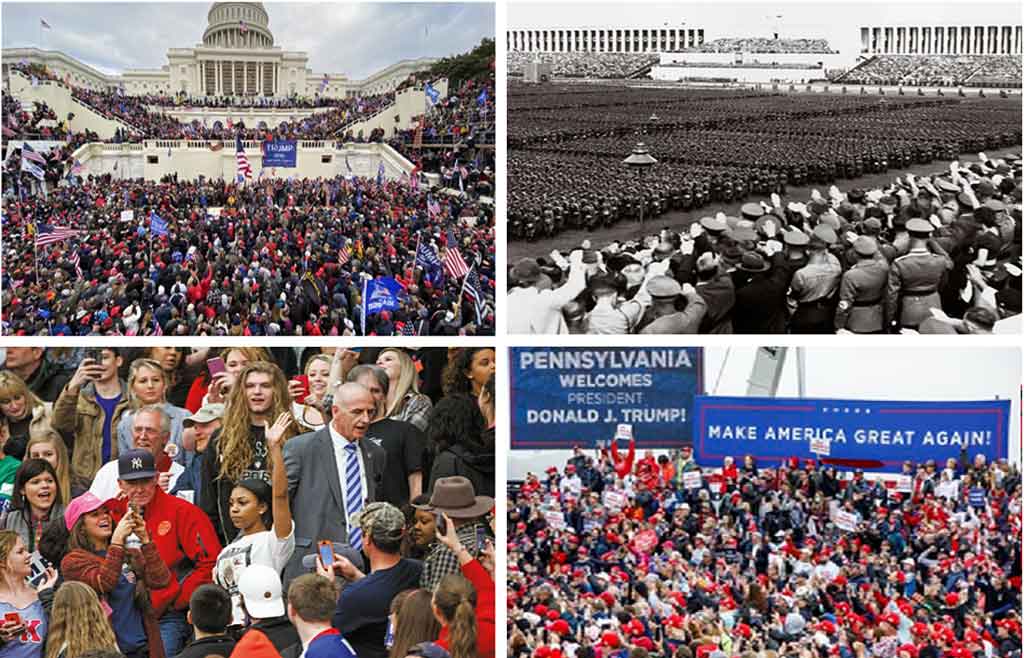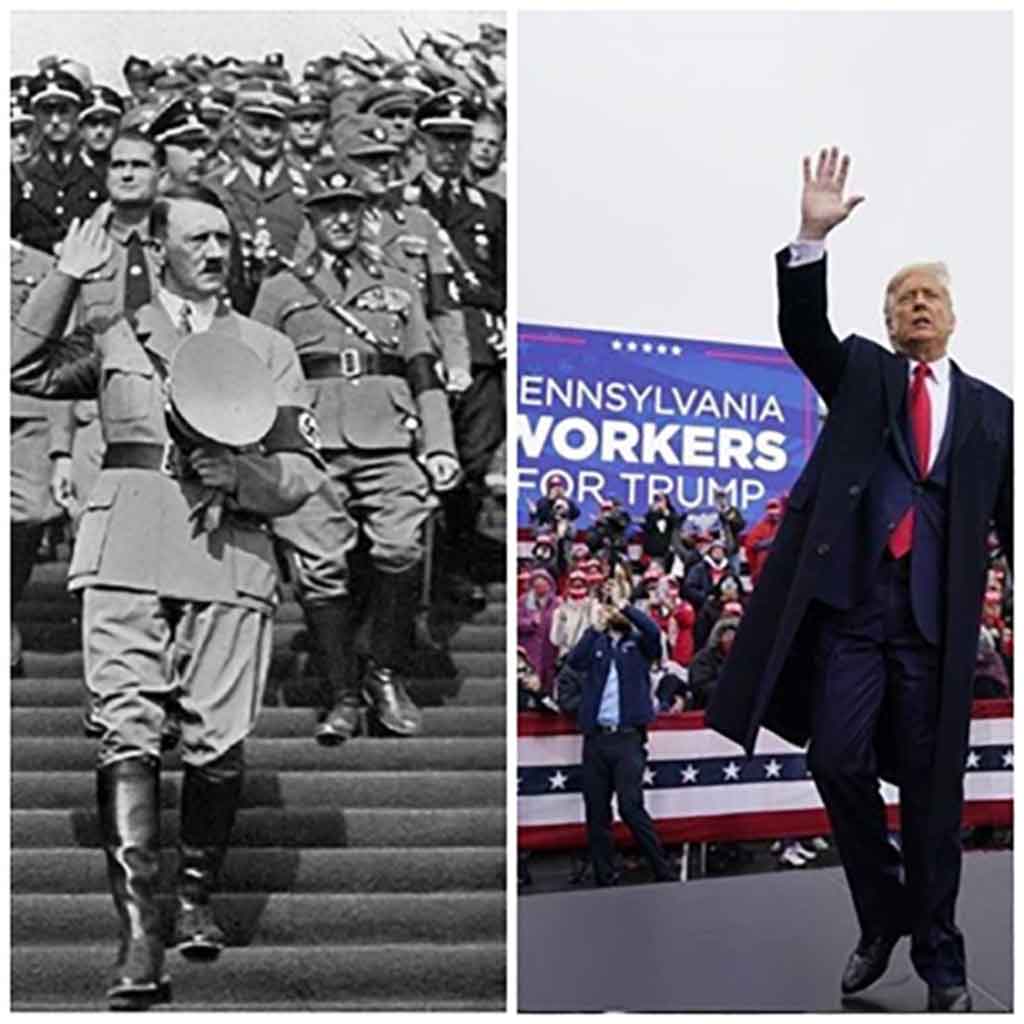It’s a difficult thing to understand, and that’s why in this article I try to find some explanation for this fact that defies everyday logic.
Why does Donald Trump have millions of fervent followers (MAGAs) and tens of millions of voters?
It is easy and very common to label those whose political positions we reject, in a sort of crescendo, as fools, phonies and/or criminals. In fact, the inability of even the most seasoned experts to understand the reality of Donald Trump’s political rise in the presidential races from 2016 to date, shows us many attacks and diatribes against that candidate and his supporters (including those I have written myself), which even go so far as to question his sanity.

When a Suffolk University and USA Today poll asked 1,000 people as early as September 2015 to describe Trump in their own terms, the most popular response was “idiot/stupid/dumb,” followed by “arrogant” and “crazy.” and then “jester/clown/fraud.”
Similarly, Trump’s supporters were branded by many as idiots and bigots. I remember a headline from March 2016: “Horrific and Disgusting Racists: Call Donald Trump and His Supporters Exactly What They Are.” Although all this is well deserved and unquestionably true, the reality is not so simple, not and cannot be all those millions of people individuals possessed by Lucifer or simple cretins. Some of my neighbors, are Trumpists and at least outwardly are (or appear to be and behave like) relatively normal people
Such simplistic imputations are reminiscent of Theodore Abel’s fascinating 1938 book “Why Hitler Came to Power,” (1) but before I get into the nitty-gritty I want to be absolutely clear: I am comparing Trump, his supporters, or their arguments to their Nazi equivalents and I make no apologies for it. But my goal is to analyze and explain behaviors that disgust and challenge us and their causes.
In 1934, T. Abel traveled to Germany and organized an essay contest, offering a prize for short autobiographies of members of the Nazi Party. He received about 600 replies, from which he was able to draw some deductions as to why so many Germans supported Adolf Hitler. Certainly, many essays expressed a considerable degree of anti-Semitism, some a truly virulent hatred of Jews and other forms of social alienation. The members of the party were indeed racist or, at least, did not oppose the anti-Semitic position (anti-Gypsy, anti-Slavic, etc.). But this is very different from saying that they joined and stayed in the party mainly or even partially because they were racists.
Abel discovered that many other motives were involved, including a sense of Germany’s decadence, a desire to rediscover the greatness of the past, a fear of social disorder (expressed in ruthless and bloodthirsty anti-communism), and a longing for a strong leader (a euphemism for savage dictator).
Trumpist fanatics attack the Capitol in Washington, trying to overturn the result of the 2020 election. AP Photo
I would say that the same goes for those who support Trump, with the characteristics of the United States and of happening 9 decades later. Some, to be sure, are white supremacists. They are all prepared to confirm their racist statements about blacks, Muslims, Mexicans and others, they do not deny it for a moment.
But are racism, bigotry, rejection of immigrants, and prejudice of all kinds the main reasons people supported Trump? Certainly not. I argue for the need to analyze and understand how Trump appealed to his people and gained their support. Showering them with well-deserved expletives is not enough to defeat them.
Witnessing a Trump rally involves much more than listening to a speech by the former president. As “important” as his words were at that rally, it is even more essential to consider the event as a whole as the representation of a vision of the world and of reality. The charge of irrationality is insufficient, because if we view the crowds supporting Trump as mindless mobs led by primitive impulses and stirred up by a narcissistic demagogue, this affects our ability to judge how frightening the attendees’ worldview is.
You can’t see the United States or the American people at a glance, it’s too big (almost 10 million km²) and it’s a lot of people (almost 336 million people). But you can see and hear a rally where you are present on a few hectares and a few thousand people. The next step is to fantasize that those few acres and thousands of people represent the United States. The Trumpists’ rally was a theatrical performance of the United States. It symbolized how Trump and his supporters would like the country to be. The activity began long before Trump’s arrival.
The long wait for the leader was integral to the performance and showed the perception of the attendees (“If I’m willing to wait that long, it’s because this event and this leader are very important to me”). It affected the way audience members viewed each other (“If others are willing to wait that long, this event and the leader must be important to them”). And it established a relationship of devotion among the crowd and a sense of identity among its members (“We are united in our devotion to this movement and to our leader”). It doesn’t matter if this happened in the 1930’s in Nuremberg, Germany or in February 2024 in Pennsylvania, USA.
Showing overwhelming and unstoppable power is part of the methods used then and now.
The wait also gave time for other “theatricalizations”. Trump’s security procedures are more rigorous than those of any other candidate. The public had to go through a metal detector, highly visible security agents abounded, looking for intruders or patrolling anti-Trump protesters against MAGA
An hour before Trump spoke, a message broadcast over the audio system instructed members of the crowd not to attack any protesters they saw as “suspicious.” Rather, they were told to call security by shouting, “Trump! Trump! Trump!” As a result of these various tactics, members of the crowd were induced to act as if they were under threat, with a Jesuit “fortress under siege” mentality which only served to reinforce the presumption that they were under threat, both from external and internal enemies.
The fuehrer arrives (or Trump, it doesn’t matter)
When Trump (or in the past the fuehrer) arrives on the scene, he always makes a “Grand Entrance” with symbols, gestures, surrounded by “worried bodyguards”, MAGA caps, many journalists and cameramen, a huge scenography, which tells the audience: “you have the privilege of seeing something exceptional, that’s why you are exceptional yourself, because you are one of us”.
This is followed by the introduction of a moderator (almost always a local far-right political leader), who calls on Trump to take the microphones. Trump’s standard, invariable argument in his speeches has three key elements. The first asserts that the United States, once great, is now weak and repeatedly humiliated by others: “Our country is in serious trouble. We don’t have wins anymore. We used to have wins, but we don’t have them anymore. When was the last time anyone saw us defeating, say, China in a trade deal? They kill us.”
The “leaders” arrive, always making a “grand entrance”.
The second is the decline of the United States as a result of the actions of its partly external enemies: China, Mexico, and other countries that he believes are cheating, corrupt, and taking jobs and wealth away from ordinary Americans. “Our real unemployment is between 18 and 20 percent. Don’t believe in the 5%- Don’t believe it… because there are no jobs, because China and Mexico have our jobs.” These external enemies thrive only through the actions of evil internal enemies. Trump labels these enemies as incompetent, others as traitors, or both. He targeted specific individuals (J. Biden, Barack Obama, Hillary Clinton, or his Republican rivals) and the political class as a whole
The third part of Trump’s argument was to identify the most important solution: himself. Throughout his speeches, Trump insisted that he is not like other politicians. He knows how to make a deal. He insisted that he has been so successful and has become so rich that he cannot be bought. President Trump: “One of the big banks came to me and said, ‘Donald, you don’t have enough loans.’ Could we lend him $4 billion? I said, ‘I don’t need it.’ I don’t want it”
As a consequence, Trump presented himself as the only person capable of restoring what the United States has lost: “I beat China all the time. All the time.” At this, the audience applauded and chanted: “We want Trump! We want Trump!” Closing that speech, he said, “If I’m elected president again, we’ll make America great again.” By using the “we” here, he included his audience and thus significantly expanded his argument, insisting that it is not just Trump, but Trump’s MAGA who will restore greatness.
Notes
(1) Theodore Abel, Why Hitler Came to Power?,Harvard University Press, 1986 – 322 pp, first edition, 1938.
- The author is a political analyst who lives in New York who often writes for Prensa Latina
mh/jo









